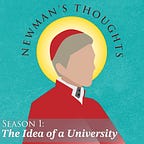Reading for Day 3: The Idea of a University, Preface, ¶ 8-12
Paperback with Introduction by Dr. Don Briel available @ Cluny Media
Full online text of The Idea of a University and other works by St. John Henry Newman are available @ the National Institute for Newman Studies’ Newman Reader
Returning, then, to the consideration of the question, from which I may seem to have digressed, thus much I think I have made good,—that, whether or no a Catholic University should put before it, as its great object, to make its students "gentlemen," still to make them something or other is its great object, and not simply to protect the interests and advance the dominion of Science. If, then, this may be taken for granted, as I think it may, the only point which remains to be settled is, whether I have formed a probable conception of the sort of benefit which the Holy See has intended to confer on Catholics who speak the English tongue by recommending to the Irish Hierarchy the establishment of a University; and this I now proceed to consider.
Here, then, it is natural to ask those who are interested in the question, whether any better interpretation of the recommendation of the Holy See can be given than that which I have suggested in this Volume. Certainly it does not seem to me rash to pronounce that, whereas Protestants have great advantages of education in the Schools, Colleges, and Universities of the United Kingdom, our ecclesiastical rulers have it in purpose that Catholics should enjoy the like advantages, whatever they are, to the full. I conceive they view it as prejudicial to the interests of Religion that there should be any cultivation of mind bestowed upon Protestants which is not given to their own youth also. As they wish their schools for the poorer and middle classes to be at least on a par with those of Protestants, they contemplate the same object also as regards that higher education which is given to comparatively the few. Protestant youths, who can spare the time, continue their studies till the age of twenty-one or twenty-two; thus they employ a time of life all-important and especially favourable to mental culture. I conceive that our Prelates are impressed with the fact and its consequences, that a youth who ends his education at seventeen is no match (cæteris paribus) for one who ends it at twenty-two.
All classes indeed of the community are impressed with a fact so obvious as this. The consequence is, that Catholics who aspire to be on a level with Protestants in discipline and refinement of intellect have recourse to Protestant Universities to obtain what they cannot find at home. Assuming (as the Rescripts from Propaganda allow me to do) that Protestant education is inexpedient for our youth,—we see here an additional reason why those advantages, whatever they are, which Protestant communities dispense through the medium of Protestantism should be accessible to Catholics in a Catholic form.
What are these advantages? I repeat, they are in one word the culture of the intellect. Robbed, oppressed, and thrust aside, Catholics in these islands have not been in a condition for centuries to attempt the sort of education which is necessary for the man of the world, the statesman, the landholder, or the opulent gentleman. Their legitimate stations, duties, employments, have been taken from them, and the qualifications withal, social and intellectual, which are necessary both for reversing the forfeiture and for availing themselves of the reversal. The time is come when this moral disability must be removed. Our desideratum is, not the manners and habits of gentlemen;—these can be, and are, acquired in various other ways, by good society, by foreign travel, by the innate grace and dignity of the Catholic mind;—but the force, the steadiness, the comprehensiveness and the versatility of intellect, the command over our own powers, the instinctive just estimate of things as they pass before us, which sometimes indeed is a natural gift, but commonly is not gained without much effort and the exercise of years.
This is real cultivation of mind; and I do not deny that the characteristic excellences of a gentleman are included in it. Nor need we be ashamed that they should be, since the poet long ago wrote, that "Ingenuas didicisse fideliter artes / Emollit mores." [“To have carefully studied the liberal arts builds morals.” (Ovid, Letters from the Black Sea 2.9.47-48] Certainly a liberal education does manifest itself in a courtesy, propriety, and polish of word and action, which is beautiful in itself, and acceptable to others; but it does much more. It brings the mind into form,—for the mind is like the body. Boys outgrow their shape and their strength; their limbs have to be knit together, and their constitution needs tone. Mistaking animal spirits for vigour, and overconfident in their health, ignorant what they can bear and how to manage themselves, they are immoderate and extravagant; and fall into sharp sicknesses. This is an emblem of their minds; at first they have no principles laid down within them as a foundation for the intellect to build upon; they have no discriminating convictions, and no grasp of consequences. And therefore they talk at random, if they talk much, and cannot help being flippant, or what is emphatically called "young." They are merely dazzled by phenomena, instead of perceiving things as they are.




